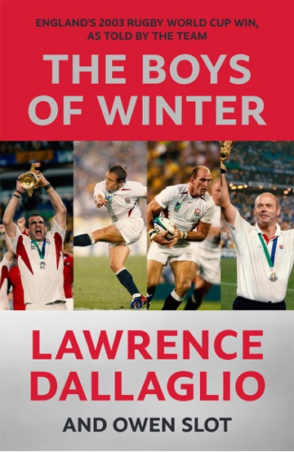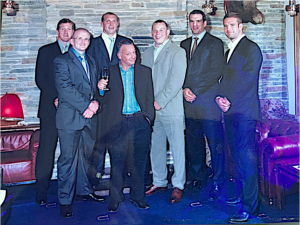Lessons for a first-time CEO from the 2003 Rugby World Cup winning team
Sep 14, 2023 |

The RUGBY WORLD CUP
SEPTEMBER 2023 – TWENTY YEARS ON…
The men’s 2023 Rugby World Cup (RWC) in France is well and truly underway. Some fantastic rugby managed to get a look in over the first weekend despite the red card and refereeing controversies. There are 48 matches in total before the tournament winner is decided on Saturday October 28 in Paris.
To coincide with RWC ’23, a book aimed at England fans was published a week before the tournament started. Twenty years ago, the England team won the 2003 RWC tournament. They beat host country Australia in the final via Jonny Wilkinson’s famous drop goal, and included ex-captain and renowned player and leader Lawrence Dallaglio. Together with Chief Sports Writer for the Times, Owen Slot, he has written an excellent new book called The Boys of Winter (Blink Publishing, 31 August 2023). In it, they met up with the rest of the 30 strong squad who were involved in winning the 2003 Rugby World Cup – the only northern hemisphere country to do so in the men’s tournament’s 36-year history.
In their discussions they not only look back on their triumph in 2003 but also discuss what they are all doing now and the transition from being the best of the best in their profession as elite athletes to finding their feet and new careers in the ‘real world’. There are some fascinating lessons in life and insights that also ring true when considering the support required, and so infrequently offered, to first-time CEOs in business.
THE SHARED GOAL
One consistent observation is that all the squad members, in common with any professional sportsperson, knew what they are aiming to do: it was simply to win. This is more complex in corporate life and often an anathema to professional sportspeople and their straightforward win-at-all-costs philosophy. The author, Lawrence Dallaglio, reflects, “It’s quite hard, because we’ve all been involved in a sport where it’s all been about results. It’s all been about delivering and performing at your best. And then you join the workplace. And I’ve been in lots of different roles since I retired and you can’t understand why people don’t share that same mentality.”
Josh Lewsey, the England full back and wing had an army career as well as playing rugby and is now the Asia-Pacific CEO of a financial consultancy. He noted, “When you are in large multinational organisations, there isn’t that clarity of purpose, because people have different motivations, the measure for success is far more opaque and people are different. People are from different backgrounds, they maybe have different key performance indicators, which basically creates this very complex web of cultures and motivations.”
THE EXPECTATION
Knowing what your transferrable skills are may be easy for others to see but is often extremely difficult when looking at oneself. Becoming the best at what you do as a sportsperson must surely indicate that you have strength of mind, passion, determination and the dedication required to excel. Surely these are valid elsewhere? But does your approach to a new role often reflect more about your expectation of what it requires rather than how you might best perform it?
Lewis Moody was England captain from 2010 until he retired in 2011, He then was at a loss as to what he should do next. “I should be doing something that fitted me as an ex-England Captain rather than something that fitted my actual skill set and actually the person that I was.” He discusses how this held him back until he found a breakthrough: “It’s only when you sit down and chat to someone who asks the right questions that you realise, ‘Actually I’m in the sh*t. I need a proper conversation’.”
THE DOUBTS
As research* confirms, over seventy percent of successful people experience anxiety and impostor symptoms about their abilities. Even the alpha males that make up the best rugby players on the planet can be plagued with doubt. This can strike even at the highest point in their career. Lewis Moody showed classic traits: “In all fairness, I never thought I was a particularly good England captain anyway. I was just the person who got the role at the time.” If they have doubts at that point, how will they feel when placed into another environment amongst others with unfamiliar and even confusing and contradictory motivations? Also, who is going to put their arm round them and volunteer to give them the help they need as a ‘fresh-faced newbie’ when they have the track record and imposing aura that they possess? Showing ‘weakness’ and asking for help doesn’t come naturally to many newly promoted CEOs or professional sportspeople.
THE TRANSITION
There’s a lot of searching, shortlisting, interviewing and cost that goes into the appointment of any CEO. There is very little time, attention or investment spent in supporting the transition of the appointed candidate into becoming a success at the new job. This is even more acute for those changing their career completely. Josh Lewsey again: “High performance environments prepare you well to lead or deal with pressure, but I don’t think they necessarily equip you well for relationships or normal life.“
Martin Johnson was the superman England captain who lifted the trophy in 2003 in Sydney. He was made captain of the winning Lions touring party in South Africa in 1997 by head coach Ian McGeechan who said, “I just liked the idea of him walking down the corridor to toss up and the South Africans opening the changing-room door to see who was there. They’d look up to see Johno framed in the doorway and know that we meant business.” Interestingly, Johnson had no experience of being an international captain when he was appointed.
As a result of his track record of winning every available trophy in the game as a player and captain, Johnson was then appointed as England Head Coach in 2008 despite having zero training or experience as a coach. He led England into the 2011 Rugby World Cup in New Zealand where England were knocked out in the Quarter Final, having won and been beaten finalists in the previous two tournaments. They were also plagued with broadsheet headlines revealing some off-pitch antics by squad members. This was the first RWC where everyone had a phone camera and there was no opportunity for downtime in public without everything being on the record.
As a result of all the above, Johnson was sacked from his position and has had no contact with the development of England Rugby since. No account was taken of his lack of coaching experience or support provided to complement the immense, unparalleled experience and leadership he brought to the role as a player, or to manage the transition into the actual job he had been hired to do.
THE SOLUTION
The absent piece is all around anticipating and planning for the transition into the role. What is missing or needs development, and how might that gap be filled? What is the environment and ecosystem that they are entering and what work needs to be done to ensure the highest possible chance for success? What independent support is provided to help the individual learn and develop into the role and accelerate the path to success, evading the errors that inexperience might produce?
In business, two out of five CEOs fail in their first eighteen months according to the Harvard Business Review** and it’s not their expertise or experience to blame. It’s their people skills, political nous and inability to build the necessary relationships with the key points of contact in the company. A professional coach and mentor can contribute massively in helping this transition – and beyond – asking the right questions and giving the benefit of their experience. This doesn’t have to have been in exactly the same role as the problems tend to be similar everywhere. They tend to be about people and managing the key relationships in the organisation the new CEO is now running. There are no right or wrong answers that can be pre-planned as the other person is different and has their own set of variables and values. As when the game is played at its best, you have to look up and play what’s in front of you
I believe passionately that professional, independent coaching and mentoring should become compulsory for all first-time CEOs. It’s a relatively minor investment with a major, long-term payback, both commercially and personally. The world has been short of great leaders recently and this would help shape the next generation of outstanding, empathetic leaders with both the vision and high emotional intelligence to achieve amazing things.
My thanks to Lawrence Dallaglio and Owen Slot for their excellent book and I recommend it highly to England rugby fans and anyone interested in the issues of elite performance and career change. Find out more about the book and buy it here: http://bit.ly/3RoE7M7.
David Roche
14 September 2023
David Roche has over 28 years’ experience as a board director, CEO and Chair, and is a professional Coach and Mentor. He runs Grey Area Coaching Ltd which focuses on first-time CEOs and can be contacted at david@greyareacoaching.com. Find out more at www.greyareacoaching.com.
References
The Boys of Winter, Lawrence Dallaglio and Owen Slot, Blink Publishing, 2023
* Gail M. Matthews, ‘Imposter Phenomenon: Attributions for Success and Failure,’ paper presented to the American Psychological Association, Toronto, 1984
** Harvard Business Review, 2005 quoting Center for Creative Leadership study
FOOTNOTE:

A blurry photo of me (holding the glass, for the avoidance of doubt!) meeting some of the England squad at a book reception c. 2003. My claim to fame is I’ve been to every men’s RWC final apart from the very first one in 1987 – I got married that particular day on 20 June. I have watched England win one and lose three finals (so far). See you in Paris in October…
Photo: Will Greenwood, Graham Rowntree, Ben Kay, David Roche, Steve Thompson, Martin Johnson, Joe Worsley)


